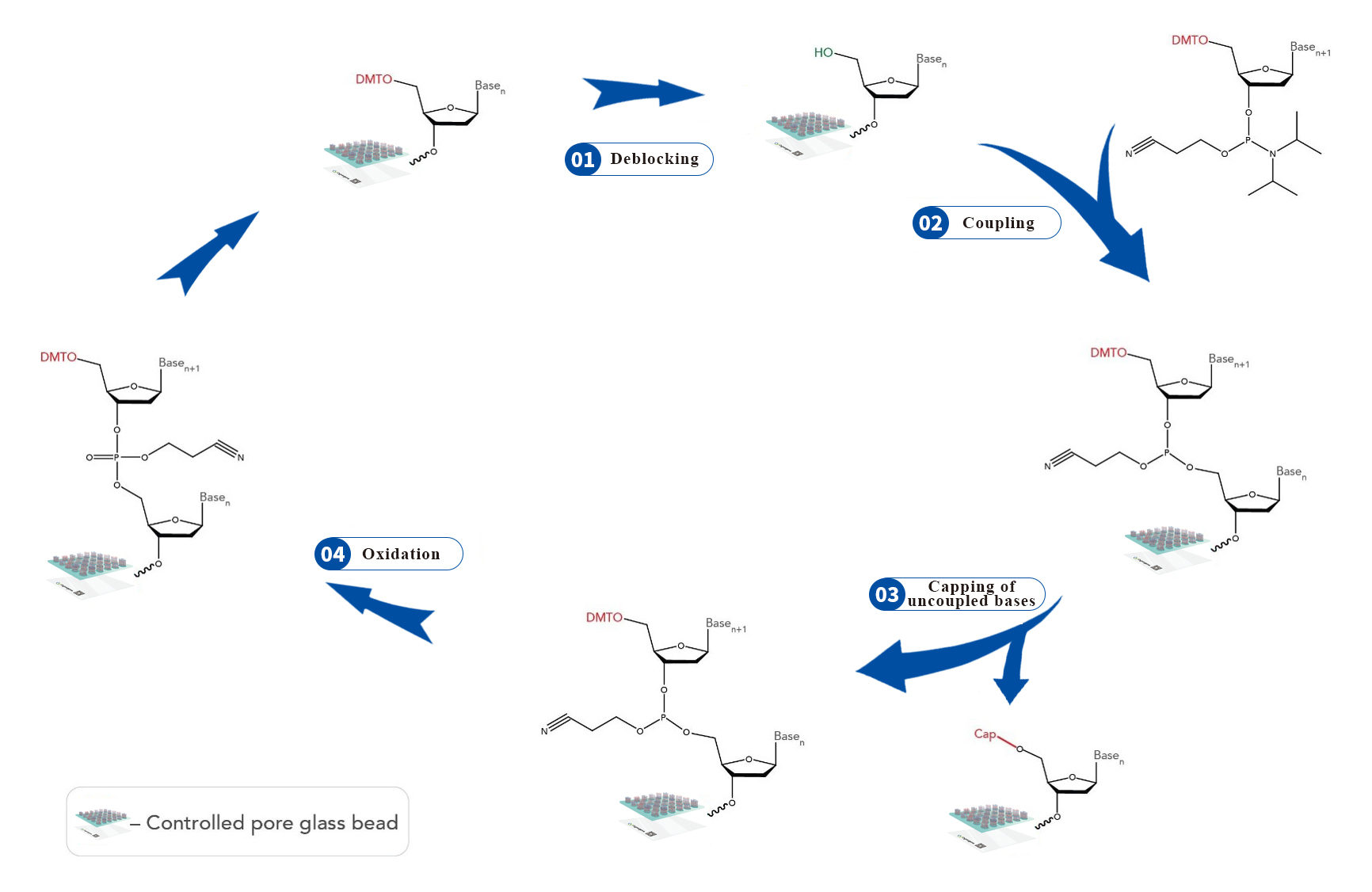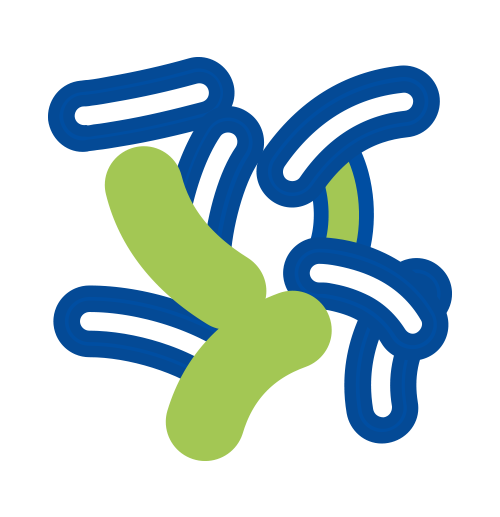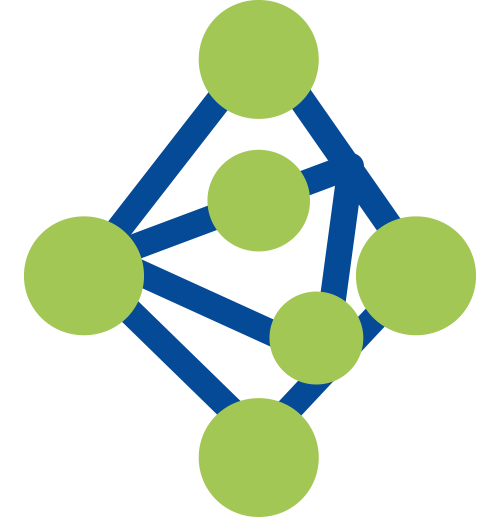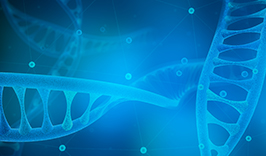DNA is the main carrier of biological information. The development of synthetic DNA technology has significantly improved our ability to understand and transform life. In order to achieve new functions, it is generally necessary to make a large number of modifications to the original sequence or synthesize brand-new sequences, and these gene sequences are most easily obtained by de novo synthesis. Second, synthetic sequences are generally preferred over natural sequences in genetic mechanism studies because they can be designed for specialized tests related to "how sequences affect function." Finally, sequences amplified or modified from natural sequences can be difficult to retrieve, thus making synthesis the only practical way to experimentally investigate them.
Chip-based oligonucleotide synthesis: Beginning in the early 1990s, Affymetrix started to develop methods for spatially localized polymer synthesis using surface photochemistry, paving the way for the development of DNA chips. They used mask-based lithography to selectively remove the protective groups of photolabile nucleoside phosphoramidites. Currently, several technologies coexist to make spatially uncoupled DNA chips. Maskless systems greatly simplify photolithography and use programmable micromirror devices (similar to those in modern digital projectors) to guide photochemical synthesis. Standard phosphoramidite modified nucleotides are used for on-chip synthesis when inkjet printing technology is employed. In addition, CombiMatrix (now CustomArray) has developed semiconductor based electrochemical nucleotide production for selective deprotection of nucleosides. There are other reported extensions and variations of microfluidic and chip-based synthesis methods, but they have not been widely used or commercialized. Oligonucleotides synthesized by microarrays are presented as "oligonucleotide pools" after they are cut and collected, and this serves as a popular and inexpensive source of artificial oligonucleotides.
Through many years of research and development, Dynegene Technologies has become the first scientific and technological enterprise in China to master high-throughput DNA synthesis technology based on inkjet printing. The maximum throughput of a single chip is 150w, which, globally, is upper-echelon, and can provide customers with high-throughput synthetic oligonucleotide pools, NGS targeted capture probes and primers, gene synthesis, standards and other services. Please feel free to reach out to us for a consultation.

Main Applications

 NGSHybridization Capture DNA Probe QuarStar Human All Exon Probes 4.0 (Tumor) QuarStar Human All Exon Probes 4.0 (Standard) QuarStar Liquid Pan-Cancer Panel 3.0 QuarStar Pan-Cancer Lite Panel 3.0 QuarStar Pan-Cancer Fusion Panel 1.0 QuarStar Pan Cancer Panel 1.0 Hybridization Capture RNA Probe QuarXeq Human All Exon Probes 3.0 HRD panel Library Preparation DNA Library Preparation Kit Fragmentation Reagent mRNA Capture Kit rRNA Depletion Kit QuarPro Superfast T4 DNA Ligase Hybridization Capture QuarHyb Super DNA Reagent Kit QuarHyb DNA Plus 2 Reagent Kit QuarHyb DNA Reagent Kit Plus QuarHyb One Reagent Kit QuarHyb Super Reagent Kit Pro Dynegene Adapter Family Dynegene Blocker Family Multiplex PCR QuarMultiple BRCA Amplicon QuarMultiple PCR Capture Kit 2.0 PathoSeq 450 Pathogen Library Corollary Reagent Streptavidin magnetic beads Equipment and Software The iQuars50 NGS Prep System
NGSHybridization Capture DNA Probe QuarStar Human All Exon Probes 4.0 (Tumor) QuarStar Human All Exon Probes 4.0 (Standard) QuarStar Liquid Pan-Cancer Panel 3.0 QuarStar Pan-Cancer Lite Panel 3.0 QuarStar Pan-Cancer Fusion Panel 1.0 QuarStar Pan Cancer Panel 1.0 Hybridization Capture RNA Probe QuarXeq Human All Exon Probes 3.0 HRD panel Library Preparation DNA Library Preparation Kit Fragmentation Reagent mRNA Capture Kit rRNA Depletion Kit QuarPro Superfast T4 DNA Ligase Hybridization Capture QuarHyb Super DNA Reagent Kit QuarHyb DNA Plus 2 Reagent Kit QuarHyb DNA Reagent Kit Plus QuarHyb One Reagent Kit QuarHyb Super Reagent Kit Pro Dynegene Adapter Family Dynegene Blocker Family Multiplex PCR QuarMultiple BRCA Amplicon QuarMultiple PCR Capture Kit 2.0 PathoSeq 450 Pathogen Library Corollary Reagent Streptavidin magnetic beads Equipment and Software The iQuars50 NGS Prep System Primers and Probes
Primers and Probes RNA SynthesissgRNA miRNA siRNA
RNA SynthesissgRNA miRNA siRNA



 Gene Synthesis
Gene Synthesis Oligo Pools
Oligo Pools CRISPR sgRNA Library
CRISPR sgRNA Library Antibody Library
Antibody Library Variant Library
Variant Library





 Tel: 400-017-9077
Tel: 400-017-9077 Address: Floor 2, Building 5, No. 248 Guanghua Road, Minhang District, Shanghai
Address: Floor 2, Building 5, No. 248 Guanghua Road, Minhang District, Shanghai Email:
Email: 







